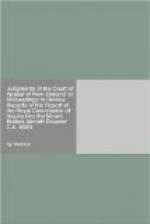Naturally the stance of the airline at the inquiry directed by the terms of reference was not included expressly in those terms. The argument presented in effect for the Commissioner on the question of jurisdiction is that comments, however severe, on the veracity and motives of witnesses were incidental to the carrying out of the express terms. We accept unhesitatingly that what is reasonably incidental is authorised (as was recognised in Cock’s case at p. 425) and also that to some degree any Commission of Inquiry has the right to express its opinion of the witnesses, much as a Court or statutory tribunal has that right.
But we think that it is a matter of degree. For present purposes it is not necessary to decide whether the law of New Zealand is still, as held in Cock’s case, that a Commission of Inquiry cannot lawfully be constituted to inquire into allegations of crime. That issue may be raised more directly by the litigation regarding the Thomas Commission. The issue now to be decided is whether the Commissioner had powers, implied as being reasonably incidental to his legitimate functions of inquiry into the causes and circumstances of the crash, to make assertions amounting to charges of conspiracy to perjure at the inquiry itself.
In considering that issue the importance of not unreasonably shackling a Commission of Inquiry has to be weighed. It is also material, however, that such a charge is calculated to attract the widest publicity, both national and international. It is scarcely distinguishable in the public mind from condemnation by a Court of law. Yet it is completely without the safeguards of rights to trial by jury and appeal. In other words, by mere implication any Commission of Inquiry, whatever its membership, would have authority publicly to condemn a group of citizens of a major crime without the safeguards that invariably go with express powers of condemnation.
We are not prepared to hold that the Commissioner’s implied powers went so far. We hold that he exceeded his jurisdiction in paragraph 377.
If, contrary to the view just expressed, the Commissioner did have jurisdiction to consider allegations of organised perjury, natural justice would certainly have required that the allegations be stated plainly and put plainly to those accused. That was not done. If it had been done, what we have said earlier is enough to show that they could well have made effective answers.
So we conclude that in making the findings or allegations stated in paragraph 377 of the report the Commission acted in excess of jurisdiction and contrary to natural justice. As previously mentioned, the conspiracy postulated in paragraph 377 is evidently intended to include as participants the chief executive of the airline, the executive pilots and members of the navigation section. If the order for $150,000 costs is quashed on the ground that the statements about a pre-determined plan of deception and an orchestrated litany of lies were made without jurisdiction and contrary to natural justice, we think that substantial justice will be done to the company and those individuals. In our opinion that costs order must be quashed on those grounds as well as on the ground that it was invalid as to amount.




